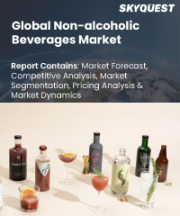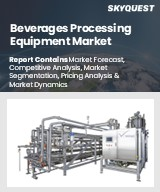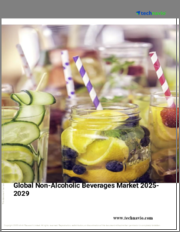
|
시장보고서
상품코드
1702217
비주류 시장 규모, 점유율, 동향, 예측 : 제품 유형, 포장 유형, 유통 채널, 지역별(2025-2033년)Non-Alcoholic Beverage Market Size, Share, Trends and Forecast by Product Type, Packaging Type, Distribution Channel, and Region, 2025-2033 |
||||||
비주류 세계 시장 규모는 2024년에 9,716억 5,000만 달러에 달했습니다. 향후 IMARC Group은 2033년에는 1조 4,488억 9,000만 달러에 달할 것으로 예상하며, 2025년부터 2033년까지 4.31%의 CAGR을 기록할 것으로 예측하고 있습니다. 현재 아시아태평양이 시장을 독점하고 있으며, 2024년 시장 점유율은 34.7%를 초과했습니다. 비주류 시장 점유율은 주로 건강한 음료 옵션에 대한 수요 증가, 1회 제공량으로 바로 마실 수 있는 비주류에 대한 요구 증가, 소비자의 소득 수준 증가에 의해 주도되고 있습니다.
비주류는 칵테일, 비주류로도 알려져 있으며, 최근 주류를 대체할 수 있는 건강하고 상쾌한 음료로 인기를 끌고 있습니다. 주스, 시럽, 소다, 기타 무알콜 원료를 혼합하는 등 다양한 방법으로 만들어지며, 과일, 허브, 향신료 등을 첨가하여 보기에도 아름답고 맛도 좋은 음료로 만들어집니다. 비주류의 가장 큰 장점 중 하나는 영양가가 높다는 것입니다. 보통 신선한 과일이나 채소 주스를 사용하기 때문에 비타민, 미네랄, 항산화 물질이 풍부하게 함유되어 있습니다. 주류에 비해 비주류에는 알코올이 포함되어 있지 않기 때문에 건강, 종교적 또는 개인적인 이유로 알코올을 섭취하지 않는 사람들에게 적합합니다. 또한, 비주류는 알코올의 잠재적인 부작용, 예를 들어 취함, 판단력 저하, 알코올 과다 섭취에 따른 건강 위험 증가 등이 없습니다. 또한 주류보다 칼로리가 낮기 때문에 더 건강한 선택이 될 수 있습니다. 현재 과일 펀치, 아이스티, 스무디, 칵테일, 수제 레모네이드 등 다양한 제품이 판매되고 있습니다.
비주류 시장 동향:
세계 비주류 시장은 소비자의 건강 인식이 높아짐에 따라 성장하고 있습니다. 이는 천연 과일 주스, 콤부차, 비타민과 미네랄이 풍부한 기능성 음료와 같은 건강한 음료에 대한 수요 증가로 인해 더욱 강화되고 있습니다. 또한, 디지털 미디어와 소셜 미디어 인플루언서의 등장은 크래프트 소다, 특수 차, 장인 정신이 깃든 커피 음료 등 독특하고 이국적인 비주류에 대한 소비자 선호를 촉진하는 데 중요한 역할을 하고 있으며, 이는 시장 성장을 견인하고 있습니다. 또한, 지속가능성과 환경 인식의 증가, 개인화 된 영양 및 맞춤화에 대한 관심이 높아짐에 따라 시장 성장을 촉진하고 있습니다. 이와는 별도로, E-Commerce 및 소비자 직접 판매와 같은 유통 채널의 확대와 설탕 및 인공 성분이 건강에 미치는 영향에 대한 인식이 높아지면서 시장 성장을 촉진하고 있습니다. 이에 따라 시장의 주요 제조업체들은 스테비아 함유 소다, 유기농 과일 주스, 천연 에너지 음료 등 저당, 천연, 유기농 비주류를 출시하여 소비자층을 확대하는 등 시장 전망을 밝게 하고 있습니다. 콜드브루 커피, 캔커피, 캔차, 병에 든 스무디 등 1회용, 휴대용, RTD(Ready to Drink) 비주류에 대한 수요 증가와 소비자의 소비 의욕이 높아지면서 시장 성장을 견인하고 있습니다.
본 보고서에서 다루는 주요 질문
- 비주류 시장의 시장 규모는?
- 비주류 시장의 향후 전망은?
- 비주류 시장을 이끄는 주요 요인은 무엇인가?
- 비주류 시장 점유율이 가장 높은 지역은 어디인가?
- 세계 비주류 시장의 주요 기업은?
목차
제1장 서문
제2장 조사 범위와 조사 방법
- 조사 목적
- 이해관계자
- 데이터 소스
- 1차 정보
- 2차 정보
- 시장 추정
- 상향식 접근
- 하향식 접근
- 조사 방법
제3장 주요 요약
제4장 소개
- 개요
- 주요 업계 동향
제5장 세계의 비주류 시장
- 시장 개요
- 시장 실적
- COVID-19의 영향
- 시장 예측
제6장 시장 내역 : 제품 유형별
- 탄산음료
- 주스
- 생수
- 스포츠 드링크와 에너지 드링크
- RTD 홍차와 커피
- 기타
제7장 시장 내역 : 포장 유형별
- 보틀
- 캔
- 카톤
- 기타
제8장 시장 내역 : 유통 채널별
- 소매
- 푸드서비스
- 슈퍼마켓과 하이퍼마켓
- 온라인 스토어
- 기타
제9장 시장 내역 : 지역별
- 북미
- 미국
- 캐나다
- 아시아태평양
- 중국
- 일본
- 인도
- 한국
- 호주
- 인도네시아
- 기타
- 유럽
- 독일
- 프랑스
- 영국
- 이탈리아
- 스페인
- 러시아
- 기타
- 라틴아메리카
- 브라질
- 멕시코
- 기타
- 중동 및 아프리카
- 시장 내역 : 국가별
제10장 SWOT 분석
- 개요
- 강점
- 약점
- 기회
- 위협
제11장 밸류체인 분석
제12장 Porter's Five Forces 분석
- 개요
- 구매자의 교섭력
- 공급 기업의 교섭력
- 경쟁 정도
- 신규 참여업체의 위협
- 대체품의 위협
제13장 가격 분석
제14장 경쟁 구도
- 시장 구조
- 주요 기업
- 주요 기업 개요
- Arizona Beverage Company
- Asahi Group Holdings Ltd.
- Danone S.A.
- Keurig Dr Pepper Inc.
- Nestle S.A.
- Parle Agro Pvt. Ltd.
- PepsiCo Inc.
- Primo Water Corporation
- Red Bull GmbH
- Suja Life LLC
- Suntory Beverage & Food Limited
- The Coca-Cola Company
The global non-alcoholic beverage market size was valued at USD 971.65 Billion in 2024. Looking forward, IMARC Group estimates the market to reach USD 1,448.89 Billion by 2033, exhibiting a CAGR of 4.31% from 2025-2033. Asia Pacific currently dominates the market, holding a market share of over 34.7% in 2024. The non-alcoholic beverage market share is primarily driven by the increasing demand for healthier beverage options, the elevating requirement for single-serve, ready-to-drink non-alcoholic variants, and the inflating income levels of consumers.
Non-alcoholic beverages, also known as mocktails or alcohol-free drinks, have gained popularity in recent years as healthy and refreshing alternatives to alcoholic beverages. They are made using various methods, including mixing juices, syrups, sodas, and other non-alcoholic ingredients, which are then garnished with fruits, herbs, and spices to create a visually appealing and delicious drink. One of the main benefits of non-alcoholic beverages is their nutritional value. These drinks are rich in vitamins, minerals, and antioxidants, as they are typically made using fresh fruit and vegetable juices. When compared to alcoholic beverages, non-alcoholic beverages do not contain alcohol, meaning they are suitable for individuals that do not consume alcohol due to health, religious, or personal reasons. In addition to this, non-alcoholic beverages do not have the potential negative effects of alcohol, such as intoxication, impaired judgment, and increased health risks associated with excessive alcohol consumption. They are also lower in calories than alcoholic beverages, making them a healthier choice. Currently, there are various product variants available, including fruit punches, iced teas, smoothies, mocktails, and homemade lemonades.
Non-Alcoholic Beverage Market Trends:
The global non-alcoholic beverage market is driven by the increasing consumer health awareness. This is further bolstered by the growing demand for healthier beverage options, such as natural fruit juices, kombucha, and functional drinks enriched with vitamins and minerals. Furthermore, the rise of digital media and social media influencers has played a significant role in creating trends and driving consumer preferences towards unique and exotic non-alcoholic beverages, such as craft sodas, specialty teas, and artisanal coffee drinks, which, in turn, is boosting the market growth. Moreover, the growing trend of sustainability and eco-consciousness and the escalating focus on personalized nutrition and customization are bolstering the market growth. Apart from this, the expansion of distribution channels, such as e-commerce and direct-to-consumer sales, and the growing awareness of the impact of sugar and artificial ingredients on health are driving the market growth. In line with this, key market manufacturers are introducing low-sugar, natural, and organic non-alcoholic beverages, such as stevia-sweetened sodas, organic fruit juices, and natural energy drinks, to increase their consumer base, which is creating a positive outlook for the market. The increasing demand for single-serve, portable, and ready-to-drink (RTD) non-alcoholic beverages, such as cold-brew coffees, canned teas, and bottled smoothies, and inflating consumer expenditure power are fueling the market growth.
Key Market Segmentation:
Product Type Insights:
- Carbonated Soft Drinks
- Juices
- Bottled Water
- Sports and Energy Drinks
- RTD Tea and Coffee
- Others
Packaging Type Insights:
- Bottles
- Cans
- Cartons
- Others
Distribution Channel Insights:
- Retail
- Food Service
- Supermarkets and Hypermarkets
- Online Stores
- Others
Regional Insights:
- North America
- United States
- Canada
- Asia-Pacific
- China
- Japan
- India
- South Korea
- Australia
- Indonesia
- Others
- Europe
- Germany
- France
- United Kingdom
- Italy
- Spain
- Russia
- Others
- Latin America
- Brazil
- Mexico
- Others
- Middle East and Africa
- The report has also provided a comprehensive analysis of all the major regional markets, which include North America (the United States and Canada); Europe (Germany, France, the United Kingdom, Italy, Spain, Russia, and others); Asia Pacific (China, Japan, India, South Korea, Australia, Indonesia, and others); Latin America (Brazil, Mexico, and others); and the Middle East and Africa.
Competitive Landscape:
- The report has also provided a comprehensive analysis of the competitive landscape in the global non-alcoholic beverage market. Competitive analysis such as market structure, market share by key players, player positioning, top winning strategies, competitive dashboard, and company evaluation quadrant has been covered in the report. Also, detailed profiles of all major companies have been provided. Some of the companies covered include Arizona Beverage Company, Asahi Group Holdings Ltd., Danone S.A., Keurig Dr Pepper Inc., Nestle S.A., Parle Agro Pvt. Ltd., PepsiCo Inc., Primo Water Corporation, Red Bull GmbH, Suja Life LLC, Suntory Beverage & Food Limited and The Coca-Cola Company. Kindly note that this only represents a partial list of companies, and the complete list has been provided in the report.
Key Questions Answered in This Report
- 1.How big is the non-alcoholic beverage market?
- 2.What is the future outlook of non-alcoholic beverage market?
- 3.What are the key factors driving the non-alcoholic beverage market?
- 4.Which region accounts for the largest non-alcoholic beverage market share?
- 5.Which are the leading companies in the global non-alcoholic beverage market?
Table of Contents
1 Preface
2 Scope and Methodology
- 2.1 Objectives of the Study
- 2.2 Stakeholders
- 2.3 Data Sources
- 2.3.1 Primary Sources
- 2.3.2 Secondary Sources
- 2.4 Market Estimation
- 2.4.1 Bottom-Up Approach
- 2.4.2 Top-Down Approach
- 2.5 Forecasting Methodology
3 Executive Summary
4 Introduction
- 4.1 Overview
- 4.2 Key Industry Trends
5 Global Non-Alcoholic Beverage Market
- 5.1 Market Overview
- 5.2 Market Performance
- 5.3 Impact of COVID-19
- 5.4 Market Forecast
6 Market Breakup by Product Type
- 6.1 Carbonated Soft Drinks
- 6.1.1 Market Trends
- 6.1.2 Market Forecast
- 6.2 Juices
- 6.2.1 Market Trends
- 6.2.2 Market Forecast
- 6.3 Bottled Water
- 6.3.1 Market Trends
- 6.3.2 Market Forecast
- 6.4 Sports and Energy Drinks
- 6.4.1 Market Trends
- 6.4.2 Market Forecast
- 6.5 RTD Tea and Coffee
- 6.5.1 Market Trends
- 6.5.2 Market Forecast
- 6.6 Others
- 6.6.1 Market Trends
- 6.6.2 Market Forecast
7 Market Breakup by Packaging Type
- 7.1 Bottles
- 7.1.1 Market Trends
- 7.1.2 Market Forecast
- 7.2 Cans
- 7.2.1 Market Trends
- 7.2.2 Market Forecast
- 7.3 Cartons
- 7.3.1 Market Trends
- 7.3.2 Market Forecast
- 7.4 Others
- 7.4.1 Market Trends
- 7.4.2 Market Forecast
8 Market Breakup by Distribution Channel
- 8.1 Retail
- 8.1.1 Market Trends
- 8.1.2 Market Forecast
- 8.2 Food Service
- 8.2.1 Market Trends
- 8.2.2 Market Forecast
- 8.3 Supermarkets and Hypermarkets
- 8.3.1 Market Trends
- 8.3.2 Market Forecast
- 8.4 Online Stores
- 8.4.1 Market Trends
- 8.4.2 Market Forecast
- 8.5 Others
- 8.5.1 Market Trends
- 8.5.2 Market Forecast
9 Market Breakup by Region
- 9.1 North America
- 9.1.1 United States
- 9.1.1.1 Market Trends
- 9.1.1.2 Market Forecast
- 9.1.2 Canada
- 9.1.2.1 Market Trends
- 9.1.2.2 Market Forecast
- 9.1.1 United States
- 9.2 Asia-Pacific
- 9.2.1 China
- 9.2.1.1 Market Trends
- 9.2.1.2 Market Forecast
- 9.2.2 Japan
- 9.2.2.1 Market Trends
- 9.2.2.2 Market Forecast
- 9.2.3 India
- 9.2.3.1 Market Trends
- 9.2.3.2 Market Forecast
- 9.2.4 South Korea
- 9.2.4.1 Market Trends
- 9.2.4.2 Market Forecast
- 9.2.5 Australia
- 9.2.5.1 Market Trends
- 9.2.5.2 Market Forecast
- 9.2.6 Indonesia
- 9.2.6.1 Market Trends
- 9.2.6.2 Market Forecast
- 9.2.7 Others
- 9.2.7.1 Market Trends
- 9.2.7.2 Market Forecast
- 9.2.1 China
- 9.3 Europe
- 9.3.1 Germany
- 9.3.1.1 Market Trends
- 9.3.1.2 Market Forecast
- 9.3.2 France
- 9.3.2.1 Market Trends
- 9.3.2.2 Market Forecast
- 9.3.3 United Kingdom
- 9.3.3.1 Market Trends
- 9.3.3.2 Market Forecast
- 9.3.4 Italy
- 9.3.4.1 Market Trends
- 9.3.4.2 Market Forecast
- 9.3.5 Spain
- 9.3.5.1 Market Trends
- 9.3.5.2 Market Forecast
- 9.3.6 Russia
- 9.3.6.1 Market Trends
- 9.3.6.2 Market Forecast
- 9.3.7 Others
- 9.3.7.1 Market Trends
- 9.3.7.2 Market Forecast
- 9.3.1 Germany
- 9.4 Latin America
- 9.4.1 Brazil
- 9.4.1.1 Market Trends
- 9.4.1.2 Market Forecast
- 9.4.2 Mexico
- 9.4.2.1 Market Trends
- 9.4.2.2 Market Forecast
- 9.4.3 Others
- 9.4.3.1 Market Trends
- 9.4.3.2 Market Forecast
- 9.4.1 Brazil
- 9.5 Middle East and Africa
- 9.5.1 Market Trends
- 9.5.2 Market Breakup by Country
- 9.5.3 Market Forecast
10 SWOT Analysis
- 10.1 Overview
- 10.2 Strengths
- 10.3 Weaknesses
- 10.4 Opportunities
- 10.5 Threats
11 Value Chain Analysis
12 Porters Five Forces Analysis
- 12.1 Overview
- 12.2 Bargaining Power of Buyers
- 12.3 Bargaining Power of Suppliers
- 12.4 Degree of Competition
- 12.5 Threat of New Entrants
- 12.6 Threat of Substitutes
13 Price Analysis
14 Competitive Landscape
- 14.1 Market Structure
- 14.2 Key Players
- 14.3 Profiles of Key Players
- 14.3.1 Arizona Beverage Company
- 14.3.1.1 Company Overview
- 14.3.1.2 Product Portfolio
- 14.3.2 Asahi Group Holdings Ltd.
- 14.3.2.1 Company Overview
- 14.3.2.2 Product Portfolio
- 14.3.2.3 Financials
- 14.3.2.4 SWOT Analysis
- 14.3.3 Danone S.A.
- 14.3.3.1 Company Overview
- 14.3.3.2 Product Portfolio
- 14.3.3.3 Financials
- 14.3.3.4 SWOT Analysis
- 14.3.4 Keurig Dr Pepper Inc.
- 14.3.4.1 Company Overview
- 14.3.4.2 Product Portfolio
- 14.3.4.3 Financials
- 14.3.5 Nestle S.A.
- 14.3.5.1 Company Overview
- 14.3.5.2 Product Portfolio
- 14.3.5.3 Financials
- 14.3.5.4 SWOT Analysis
- 14.3.6 Parle Agro Pvt. Ltd.
- 14.3.6.1 Company Overview
- 14.3.6.2 Product Portfolio
- 14.3.7 PepsiCo Inc.
- 14.3.7.1 Company Overview
- 14.3.7.2 Product Portfolio
- 14.3.7.3 Financials
- 14.3.7.4 SWOT Analysis
- 14.3.8 Primo Water Corporation
- 14.3.8.1 Company Overview
- 14.3.8.2 Product Portfolio
- 14.3.8.3 SWOT Analysis
- 14.3.9 Red Bull GmbH
- 14.3.9.1 Company Overview
- 14.3.9.2 Product Portfolio
- 14.3.9.3 SWOT Analysis
- 14.3.10 Suja Life LLC
- 14.3.10.1 Company Overview
- 14.3.10.2 Product Portfolio
- 14.3.11 Suntory Beverage & Food Limited
- 14.3.11.1 Company Overview
- 14.3.11.2 Product Portfolio
- 14.3.11.3 Financials
- 14.3.12 The Coca-Cola Company
- 14.3.12.1 Company Overview
- 14.3.12.2 Product Portfolio
- 14.3.12.3 Financials
- 14.3.12.4 SWOT Analysis
- 14.3.1 Arizona Beverage Company

















